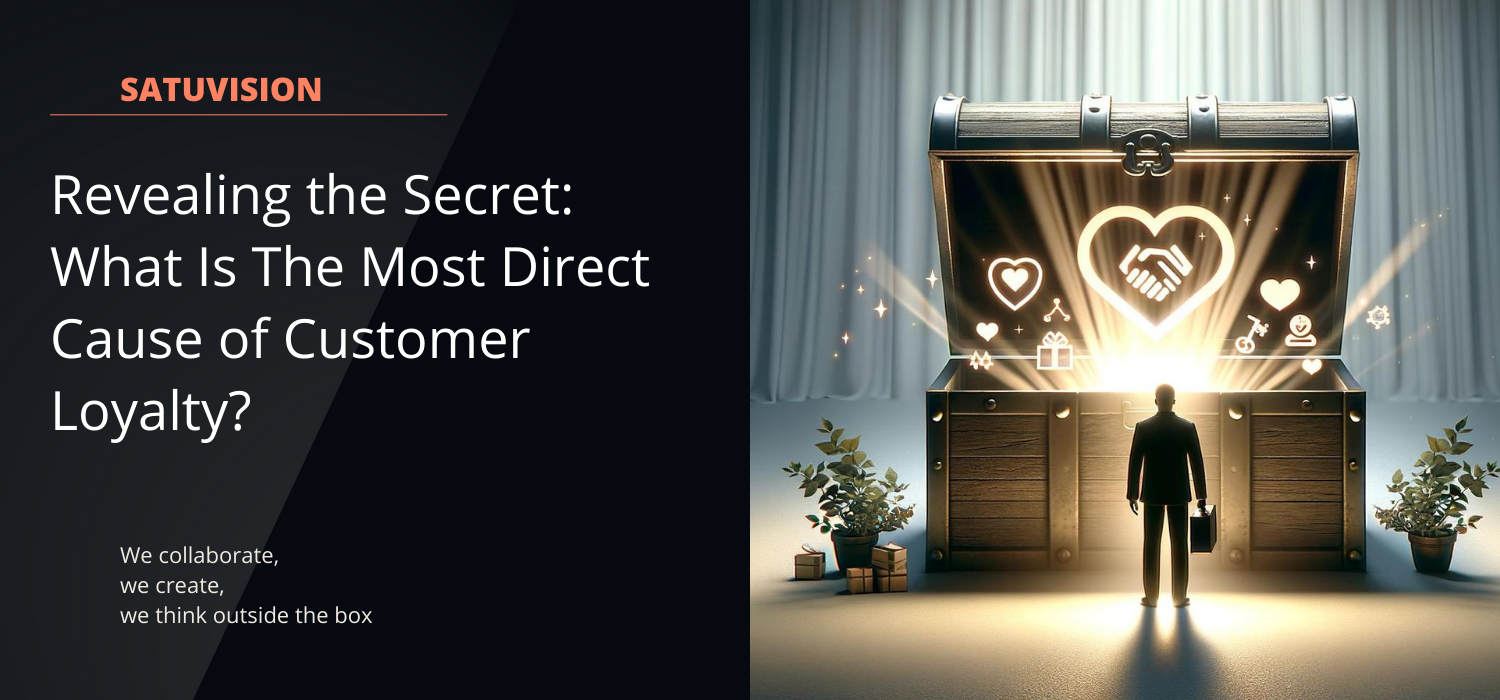Excellent Customer Experience or Trust?: What Is The Most Direct Cause of Customer Loyalty?
The way we think about customer loyalty is changing. It’s no longer just about what happens during a transaction; now, it’s about the whole experience from start to finish. Therefore, understanding the most direct cause of customer loyalty is important.
No matter what industry your business is in, the direct reasons for customer loyalty are important. For example, in the world of hospitality, winning over customers isn’t just about the physical aspects of their stay. It’s more about forming a bond, getting what the guests need, and aiming to go above and beyond what they expect at every step.
So, when we ask, what is the most direct cause of customer loyalty? This means weaving every part of the guest’s experience into one seamless story. So, let me invite you to dive deeper into each detail by what is the most direct cause of customer loyalty.
Table of Contents
So, What is Customer Loyalty?

Here are easy ways to say this: customer loyalty is a consistent result of a customer’s needs being met and exceeding their expectations.
A study said that customer loyalty refers to how likely customers are to choose a particular brand over others when making frequent purchases. It plays a crucial role in maintaining a thriving business.
So, how important Is loyalty for the hospitality business?
Customer loyalty is not just a metric; it’s an essential business strategy that sets you apart from your competitors and ensures customer retention.
In the hotel industry, customer satisfaction is essential as a key business strategy. When guests feel special and get great service, they’re more likely to come back. This helps hotels make more money and prevents them from spending too much on new customers.
One key to customer loyalty is building strong connections with your guests. Even a small increase in the number of customers who keep coming back can boost profits a lot, up to 25% or even 95%.
So, having a good plan to make customers want to stick around is crucial compared to other marketing tactics like lowering prices or running promotions. It not only adds to market share but also enhances growth rates in the hospitality sector.
3 Major Answers for What is The Most Direct Cause of Customer Loyalty?
Creating outstanding experiences and building trust are most direct cause of customer loyalty. This involves offering personalized services, rewards, and discounts to returning customers.
Read more for a more in-depth discussion on this topic: Restaurant Customer Experience: 4 Ways to Foster Customer Loyalty
Exceptional Customer Experience
Ensuring customers have a great experience is vital for businesses. To deliver an exceptional customer experience, you have to be attentive, responsive, and timely deliver, with a positive attitude; this can foster your customer loyalty.
And a fun fact: providing exceptional customer experience leads to satisfied customers
Research indicates that satisfied customers are more likely to stay loyal, spend more money, and recommend the business to others. This results in increased revenue and lower costs for acquiring new customers.
Exceptional customer service also helps businesses stand out from the competition and build a positive online reputation, which is crucial for the success of hospitality businesses.

To foster customer loyalty in the industry, you can follow these tips:
- Personalized Welcome: Create lasting impressions with personalized welcome messages, gift baskets, or surprise amenities based on guest preferences.
- Special Events: Host tailored events or promotions aligning with guest preferences to create unique and memorable experiences.
- Tiered Loyalty Programs: Implement loyalty programs with tiered rewards, providing exclusive benefits based on customer engagement or visit frequency to encourage repeat business.
- Bespoke Services: Offer personalized services or gifts for special occasions like anniversaries, leveraging past guest interactions to create a memorable experience and increase customer loyalty.
Trust and Credibility
Earning customer loyalty in the hospitality industry is closely tied to building trust and credibility. Trust plays a pivotal role as customers rely on establishments for their safety, comfort, and overall enjoyment.
Trust is key to maintaining a loyal customer base and ensuring long-term business success. Loyalty initiatives serve as potent tools for enhancing trust and retaining customers. Methods such as personalization, effective communication, feedback mechanisms, and special events contribute to building trust in the hospitality sector.
By making a custom experience to individual preferences, fostering open communication, and investing in unique and memorable interactions, establishments can create positive impressions that foster loyalty and trust.
Loyalty programs, personalized experiences, and effective communication and feedback channels all serve as valuable tools for building trust and cultivating a loyal customer base.
Personalization and Tailored Services (Loyalty Program)
Customizing services and experiences to match each customer’s unique needs and likes is a key way to win their loyalty.
When your business offerings suit individual preferences, they not only make customers feel special and seen but also boost their happiness and commitment to the brand.
Providing the right thing a customer wants or needs can significantly increase their satisfaction. To do this effectively, hospitality businesses use data analytics to understand customer habits, track what they buy and how they interact, and categorize customers by their demographics or behavior.
This focused approach helps forge strong customer bonds and ensures loyalty in a competitive market where making a personal connection and staying relevant is more important than ever.
Several examples of how you can customize services and experiences:
- Crafting marketing efforts that cater to specific customer groups based on their profiles and behaviors.
- Providing customer service meets each person’s unique needs, like special deals or early product access.
- Giving rewards that truly match customers’ likes, using their shopping history and preferences.
- Adding surprise elements to loyalty programs, such as unexpected gifts or personalized acts of appreciation.
- Introducing fun, interactive challenges that reflect each customer’s interests.
- Implementing feedback mechanisms to improve personalization based on customer input.
- Customizing the website experience for each visitor according to their preferences.
Bonus Point: Consistent Branding That Loved By Your Target Audience
Consistent branding is a powerful foundation for building customer loyalty, especially for a business with a niche market with the same value.
A well-executed consistent branding strategy reassures customers of the quality and your value of the products or services, encouraging repeated interactions.
One real-life example of consistent branding leading to customer loyalty is Coca-Cola. The iconic red and white color scheme and classic logo have remained unchanged for decades.
This visual consistency has contributed to Coca-Cola’s strong brand recognition and loyalty. The brand’s consistent messaging, such as the “Share a Coke” campaign, has fostered a sense of community and connection among consumers.
This consistency in branding has helped Coca-Cola build trust and reliability, creating a strong emotional bond with customers.
FREE RESOURCE: Restaurant Competitive Analysis Breakdown: In-Depth Example and Insights
Tips on How to Increasing Customer Loyalty [+Real Life Study Case]
Here are tips on how to increase customer loyalty and the real-life study to follow.
Designing Effective Loyalty Programs
A Study mentioned that creating effective loyalty programs is a direct way to build customer loyalty. These programs encourage repeat purchases and foster a sense of belonging, offering exclusive offers, rewards, and recognition.
In the hospitality industry, loyalty programs can significantly build customer loyalty. However, it’s essential to recognize that well-structured loyalty programs are just one aspect.
Exceptional customer service and customers’ emotional connection with a hotel remain crucial for loyalty. Hotels must develop loyalty programs that not only improve customer satisfaction but also complement the experiences that customers cherish.
Loyalty programs need careful design to match customer preferences and enhance satisfaction, regardless of the approach taken. When customers see the value and emotional connection a loyalty program offers, combined with satisfaction, it can increase customer loyalty.
Therefore, while loyalty programs are essential in the modern hotel industry, they alone cannot guarantee unwavering customer loyalty. Exceptional customer service and the emotional bond with a hotel continue to be the foundation of loyalty.
Some examples of loyalty programs in the hospitality industry include:
- Points System
- Partnership Rewards
- Personalized Rewards
- Discounted Rates and Concessions
- Free Nights
Look into a real-life case of how a loyalty program can create a loyal customer. Urban Outfitters launched “Urban Outfitters Rewards,” a free loyalty program offering members a 10% discount on their initial purchase. Members earn points for future purchases, receiving a $5 credit for every 100 points accumulated. Joining grants 75 points, with an additional 130 points available by downloading the app, enabling push notifications, and subscribing to the newsletter. Points can also be earned by purchasing items or writing reviews.
Nurturing Long-Term Relationships
Based on a study, nurturing long-term relationships is a crucial aspect of fostering customer loyalty in the hospitality industry. Loyalty programs, effective strategies to keep customers, personalized guest experiences, and good customer relationship management all play a big role in connecting with guests. By focusing on these things, hotels can make guests happier, encourage loyalty, and boost their reputation in the industry.
The goal of loyalty in a thriving business centers on establishing a long-term relationship between the customer and the enterprise. The ultimate objective of loyalty programs is to foster this beneficial customer relationship, which is crucial for sustained success in the hospitality industry.
Hence, by prioritizing strategies that promote guest loyalty, like delivering personalized service and maintaining consistent experiences, hotels can leave a lasting impact on guests and inspire them to return.
For example, the iconic example is the relationship between Apple Inc. and its customers. Apple has cultivated a deeply loyal customer base over decades by consistently delivering innovative products, maintaining high standards of quality, and creating an ecosystem that encourages customers to invest in multiple Apple products. The company’s approach to design, functionality, and user experience has fostered a community of users who are not just loyal to the brand but also advocate for it.
Conclusion: Unraveling the Threads of Customer Loyalty
In conclusion, what is the most direct cause of customer loyalty is a nuanced interplay of exceptional experiences, trust, personalization, understanding customer behavior, strategic loyalty programs, and a commitment to nurturing long-term relationships. By unraveling these threads, businesses can uncover the secrets to creating a loyal customer base that stands the test of time.
Frequently Asked Questions?
Positive customer experience is the primary factor leading to brand loyalty. Although other factors influence decision-making, customer experience is the most crucial brand differentiator.
Customers who are committed to a particular company are not easily influenced by price or availability. They prefer to pay a higher price to ensure the same quality service and product they are familiar with and appreciate. Customer loyalty stems from a company consistently meeting and surpassing customer expectations.
Unlock the secret behind unwavering customer loyalty in the hospitality industry, explore the strategies that lead to lasting guest loyalty with our expert insights. Click here to learn the most direct cause of customer loyalty!





